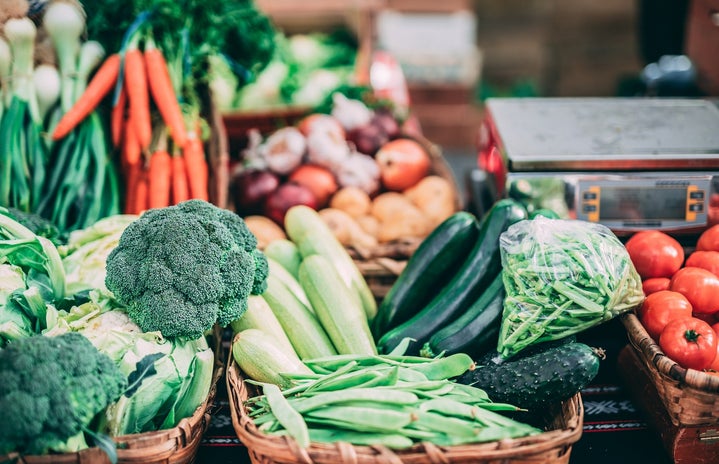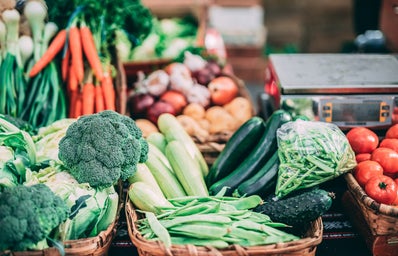Fall semester is in full swing and students are getting back into the swing of things, leaving a parents’ house for the first time (or maybe for the second or third time). I wanted to address the importance of feeding yourself. It’s hard to go from relying on your parents to suddenly buying your own necessities. Here are my essential grocery items and my monthly budgeting strategies.
Before You Reach the Store
- Do your research and find a good grocery store (or two) in your area that will give you the best deals and prices
- Find out which grocery store has the best prices in each category (for example I know that Trader Joes has cheaper prices for produce than King Soopers).
- Budget how much you want to spend (I budget by month, but it is also possible to budget on a week to week basis).
- Gather your coupons! Digital coupons and Newspaper coupons are often overlooked by new shoppers.
- Check your local newspaper and newspapers in store.
- Pay attention to emails and deals.
- Figure out ahead of time what meals you would like to prepare. Find recipes. My favorite app to use is the New York Times cookbook app (it’s free!).
- Plan out your essentials that come in handy in a pinch.
- Use shopping apps and digital shopping lists.
- Bring your reusable bags to bypass any fees on plastic grocery bags.
Every grocery list should include the following:
- Fruits and vegetables
- Some source of protein
- Some source of carbohydrates
- Snacks (preferably healthy)
- A treat of some sort

My Grocery List
I’m a vegetarian, so I have to be very conscious about getting enough protein and healthy minerals. My shopping list looked like this for this month:
- Apples, bananas, frozen fruit
- Frozen meals
- Organic yogurt
- French baguette
- Cans of soup
- Boxes of mac and cheese
- Frozen fried rice
- Cauliflower, spinach
- Orange juice
- Organic tofu
- Almond milk
- Coffee
- Ice cream
- Hummus
- Wheat bread
Basic Budgeting
In the end, my grocery bill was around $152. I usually budget so spend about $150 a month on groceries. I try to only get absolutely what I need and to avoid buying similar items. I also look for the best deals and buy mostly in bulk because I save money buying multiple items at once. I also plan ahead and get items that can be used in a lot of different recipes. I have changed my monthly grocery budget a few times based on what I found worked. It is important to be able to be flexible at first and then nail down a rough budget. I use a budget planner to track every single one of my expenses on a monthly basis so I can plan accordingly. I break down my necessities (such as rent, groceries, and utilities) and my other expenses such as eating out and shopping.
Breaking down my grocery list
I enjoy making smoothies in the morning that include a lot of fruits and vegetables (and orange juice). I have found that this is really helpful in contributing to my daily intake of nutrients. Yogurt, breads, and cereals provide calcium and fiber in my diet. I really rely on frozen meals, cans of soup, and boxed mac and cheese because these are really easy and still provide a lot of nutrients and I can always spice it up (by adding spices, veggies, and sides). I also utilize tofu, nuts, cheese, and dark leafy greens to provide my protein so I always make sure I include a few of these items in my grocery cart. I am a pretty big snacker so I try to pick up snacks that are a little bit more healthy. I like mixed nut packs, hummus, fruit, raisins/cranberries, and protein bars. I usually attempt to pick up some snacks that would be efficient to bring to campus with me. I generally reach for cereal bars and bags of chips which are super quick and easy. I’m a fan of treating yourself so I like to have at least a few treats around, because let’s face it, It’s important to treat yourself once in a while.
Meals
I think it is beneficial if meals are as simple as possible, even if you have to look through a few different recipes. It costs a lot of money to buy a bunch of spices and exotic ingredients to only use them once or twice. In my opinion, it’s useful to plan meals with friends or roommates (if you can pick recipes you both would like) so that you can split costs.
I have found that you need to change up your meals in order to not drive yourself crazy. It’s important to have variety. It’s also fun to try new recipes. However, it can be really disappointing and expensive if a recipe does not work out. My advice is to start slow and grow your skills if cooking is a little bit more challenging for you. Change a sauce/dressing on a meal, include different/new fruits and vegetables in a recipe, change proteins and spices. It’s pretty easy to remix recipes so that it tastes completely different. Lastly, find a brand of frozen food you like and try all of their products. I found this is a great way to get more meals in while knowing I like the brand so I am not wasting money on something I do not like and waste.
Use these tips on budgeting, meal prep, and nutrition to help plan ahead for the month to make college life a little easier.



